Abstract
BACKGROUND: Somatostatin analogues effectively control flushing and diarrhoea in patients with the carcinoid syndrome. The octapeptide lanreotide is available in slow release form, which could eliminate the necessity of twice a day injections as with octreotide. PATIENTS AND METHODS: 39 patients with carcinoid syndrome were included in a prospective multicentre study. Patients received lanreotide 30 mg intramuscularly every 14 days for six months. The number and intensity of flushing episodes and bowel movements, urinary 5 hydroxy-indolacetic acid (5 HIAA) concentrations, and variations of tumour mass were recorded. RESULTS: After one month of treatment, flushing episodes (median (range)) decreased significantly (3 (0.3-24) episodes per day v 1 (0-15), p = 0.04) and completely resolved in 39% of the patients. A significant decrease was seen in the number of bowel movements and discomfort related to diarrhoea. Urinary 5 HIAA concentrations were unchanged in 57% of the patients and decreased in 18%. After six months of treatment, the actuarial proportions of patients with at least a 50% decrease in the number of flushing episodes and bowel movements were 54% and 56%, respectively. Forty two per cent of the patients who were treated for six months had at least a 50% reduction in 5 HIAA values. No clear signs of regression of tumours were seen in any of the patients. Lanreotide was well tolerated despite transient mild pain or erythema at the injection site in 25% of the patients. Biliary lithiasis appeared in two patients after six months of lanreotide. CONCLUSION: Lanreotide, 30 mg intramuscularly every other week, is an effective and convenient treatment in patients with the carcinoid syndrome.
Full text
PDF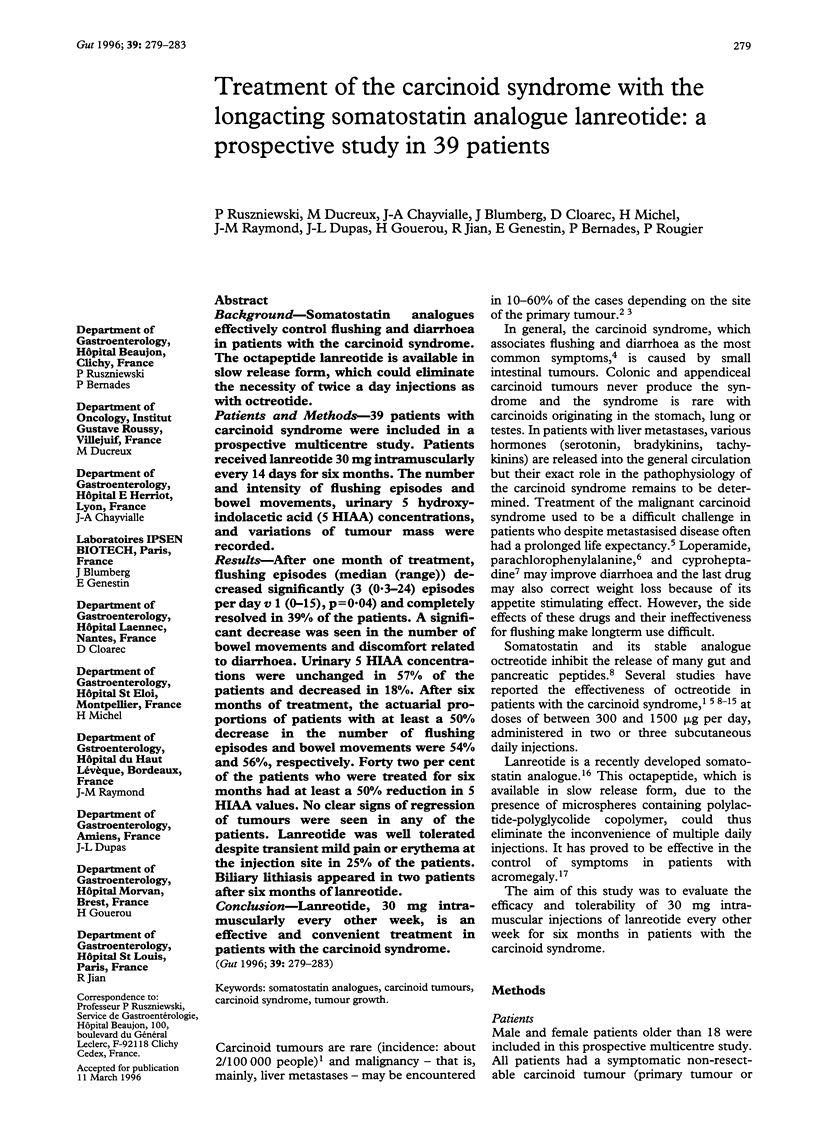
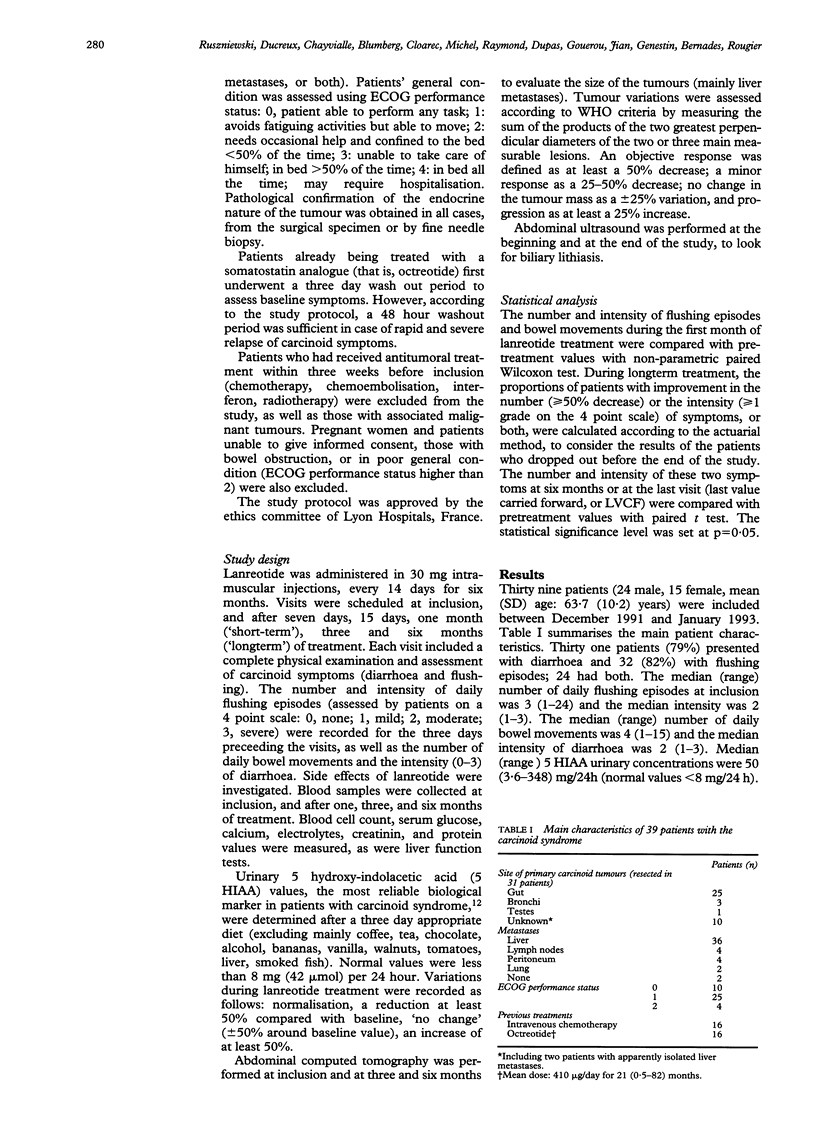
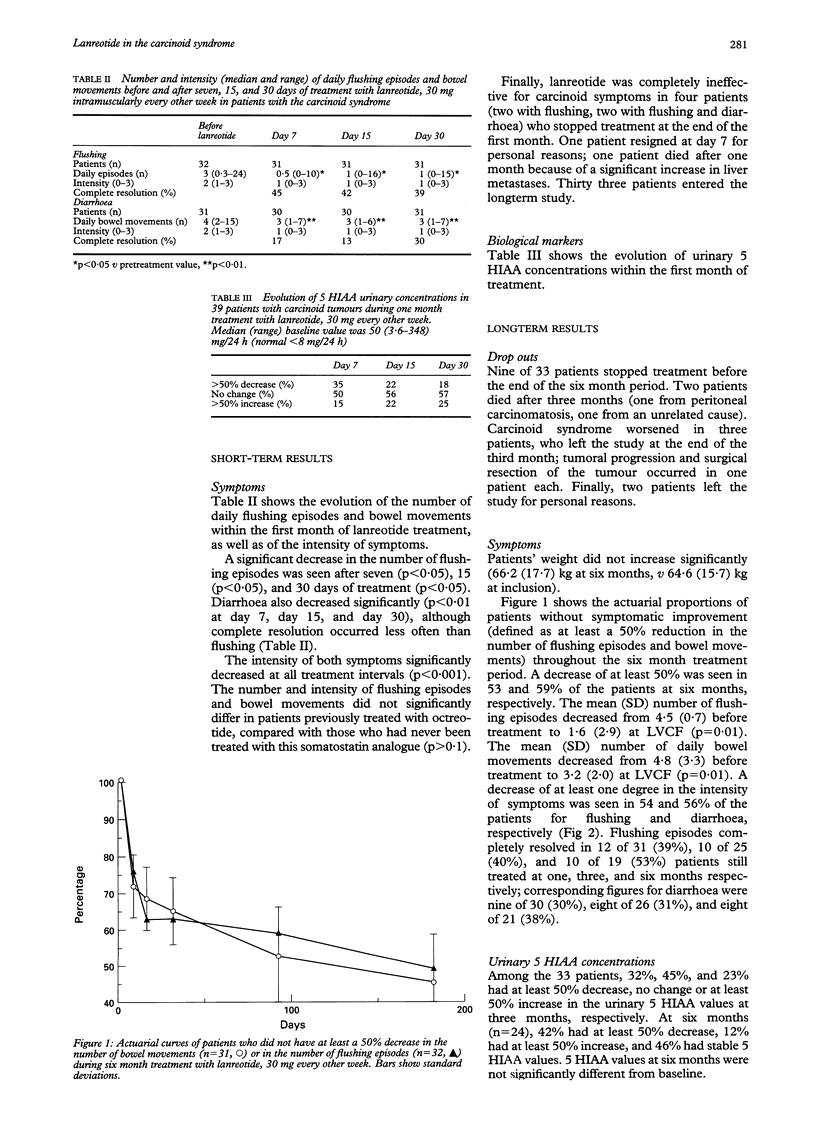
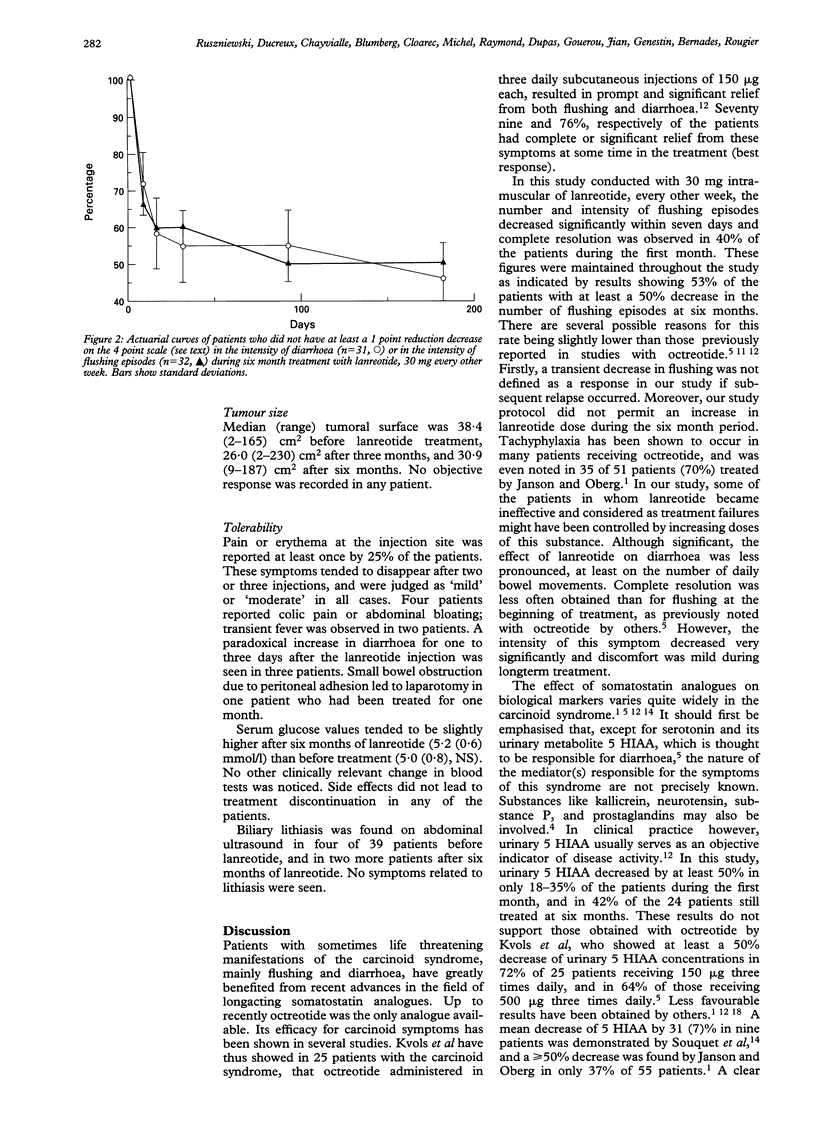
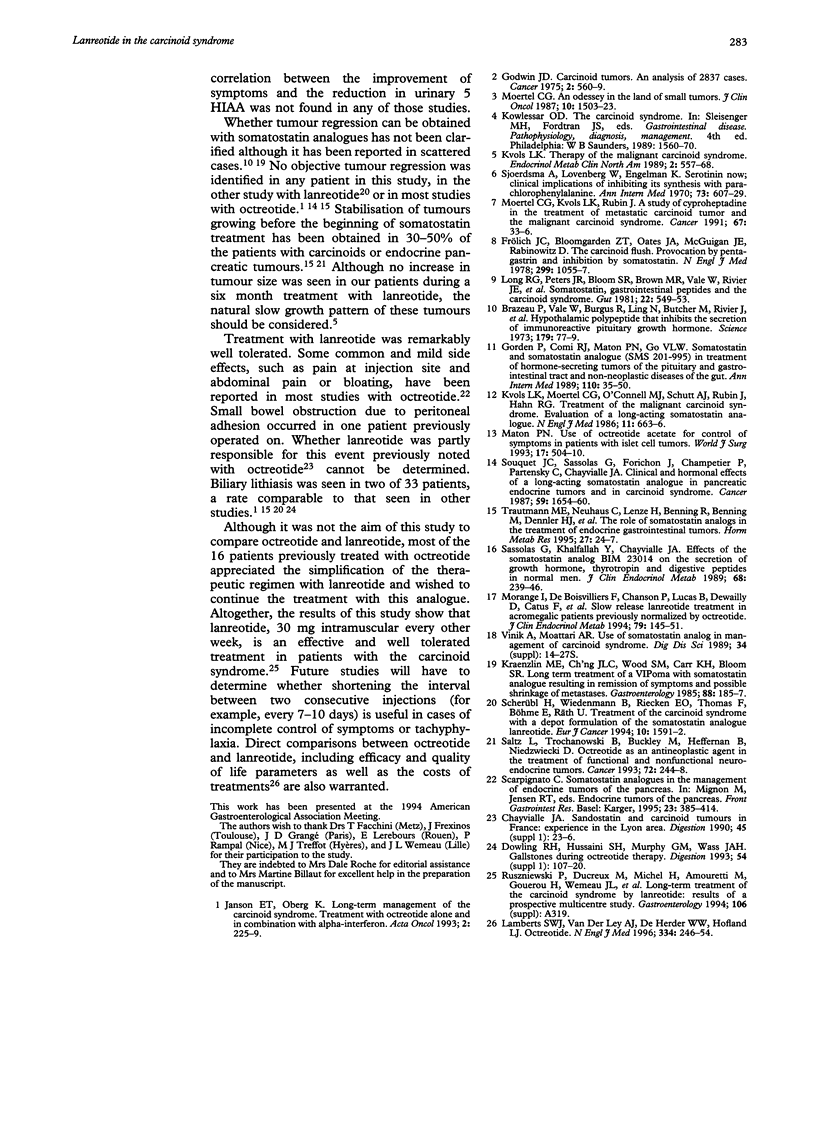
Selected References
These references are in PubMed. This may not be the complete list of references from this article.
- Brazeau P., Vale W., Burgus R., Ling N., Butcher M., Rivier J., Guillemin R. Hypothalamic polypeptide that inhibits the secretion of immunoreactive pituitary growth hormone. Science. 1973 Jan 5;179(4068):77–79. doi: 10.1126/science.179.4068.77. [DOI] [PubMed] [Google Scholar]
- Chayvialle J. A. Sandostatin and carcinoid tumours in France: experience in the Lyon area. Digestion. 1990;45 (Suppl 1):23–26. doi: 10.1159/000200257. [DOI] [PubMed] [Google Scholar]
- Dowling R. H., Hussaini S. H., Murphy G. M., Wass J. A. Gallstones during octreotide therapy. Digestion. 1993;54 (Suppl 1):107–120. doi: 10.1159/000201088. [DOI] [PubMed] [Google Scholar]
- Frölich J. C., Bloomgarden Z. T., Oates J. A., McGuigan J. E., Rabinowitz D. The carcinoid flush. Provocation by pentagastrin and inhibition by somatostatin. N Engl J Med. 1978 Nov 9;299(19):1055–1057. doi: 10.1056/NEJM197811092991908. [DOI] [PubMed] [Google Scholar]
- Godwin J. D., 2nd Carcinoid tumors. An analysis of 2,837 cases. Cancer. 1975 Aug;36(2):560–569. doi: 10.1002/1097-0142(197508)36:2<560::aid-cncr2820360235>3.0.co;2-4. [DOI] [PubMed] [Google Scholar]
- Gorden P., Comi R. J., Maton P. N., Go V. L. NIH conference. Somatostatin and somatostatin analogue (SMS 201-995) in treatment of hormone-secreting tumors of the pituitary and gastrointestinal tract and non-neoplastic diseases of the gut. Ann Intern Med. 1989 Jan 1;110(1):35–50. doi: 10.7326/0003-4819-110-1-35. [DOI] [PubMed] [Google Scholar]
- Janson E. T., Oberg K. Long-term management of the carcinoid syndrome. Treatment with octreotide alone and in combination with alpha-interferon. Acta Oncol. 1993;32(2):225–229. doi: 10.3109/02841869309083916. [DOI] [PubMed] [Google Scholar]
- Kraenzlin M. E., Ch'ng J. L., Wood S. M., Carr D. H., Bloom S. R. Long-term treatment of a VIPoma with somatostatin analogue resulting in remission of symptoms and possible shrinkage of metastases. Gastroenterology. 1985 Jan;88(1 Pt 1):185–187. doi: 10.1016/s0016-5085(85)80153-0. [DOI] [PubMed] [Google Scholar]
- Kvols L. K., Moertel C. G., O'Connell M. J., Schutt A. J., Rubin J., Hahn R. G. Treatment of the malignant carcinoid syndrome. Evaluation of a long-acting somatostatin analogue. N Engl J Med. 1986 Sep 11;315(11):663–666. doi: 10.1056/NEJM198609113151102. [DOI] [PubMed] [Google Scholar]
- Kvols L. K. Therapy of the malignant carcinoid syndrome. Endocrinol Metab Clin North Am. 1989 Jun;18(2):557–568. [PubMed] [Google Scholar]
- Lamberts S. W., van der Lely A. J., de Herder W. W., Hofland L. J. Octreotide. N Engl J Med. 1996 Jan 25;334(4):246–254. doi: 10.1056/NEJM199601253340408. [DOI] [PubMed] [Google Scholar]
- Long R. G., Peters J. R., Bloom S. R., Brown M. R., Vale W., Rivier J. E., Grahame-Smith D. G. Somatostatin, gastrointestinal peptides, and the carcinoid syndrome. Gut. 1981 Jul;22(7):549–553. doi: 10.1136/gut.22.7.549. [DOI] [PMC free article] [PubMed] [Google Scholar]
- Maton P. N. Use of octreotide acetate for control of symptoms in patients with islet cell tumors. World J Surg. 1993 Jul-Aug;17(4):504–510. doi: 10.1007/BF01655110. [DOI] [PubMed] [Google Scholar]
- Moertel C. G., Kvols L. K., Rubin J. A study of cyproheptadine in the treatment of metastatic carcinoid tumor and the malignant carcinoid syndrome. Cancer. 1991 Jan 1;67(1):33–36. doi: 10.1002/1097-0142(19910101)67:1<33::aid-cncr2820670107>3.0.co;2-e. [DOI] [PubMed] [Google Scholar]
- Morange I., De Boisvilliers F., Chanson P., Lucas B., DeWailly D., Catus F., Thomas F., Jaquet P. Slow release lanreotide treatment in acromegalic patients previously normalized by octreotide. J Clin Endocrinol Metab. 1994 Jul;79(1):145–151. doi: 10.1210/jcem.79.1.8027218. [DOI] [PubMed] [Google Scholar]
- Saltz L., Trochanowski B., Buckley M., Heffernan B., Niedzwiecki D., Tao Y., Kelsen D. Octreotide as an antineoplastic agent in the treatment of functional and nonfunctional neuroendocrine tumors. Cancer. 1993 Jul 1;72(1):244–248. doi: 10.1002/1097-0142(19930701)72:1<244::aid-cncr2820720143>3.0.co;2-q. [DOI] [PubMed] [Google Scholar]
- Sassolas G., Khalfallah Y., Chayvialle J. A., Cohen R., Merabet S., Casez J. P., Calvet P., Cabrera P. Effects of the somatostatin analog BIM 23014 on the secretion of growth hormone, thyrotropin, and digestive peptides in normal men. J Clin Endocrinol Metab. 1989 Feb;68(2):239–246. doi: 10.1210/jcem-68-2-239. [DOI] [PubMed] [Google Scholar]
- Scherübl H., Wiedenmann B., Riecken E. O., Thomas F., Böhme E., Räth U. Treatment of the carcinoid syndrome with a depot formulation of the somatostatin analogue lanreotide. Eur J Cancer. 1994;30A(10):1590–1591. doi: 10.1016/0959-8049(94)90065-5. [DOI] [PubMed] [Google Scholar]
- Serotonin now: clinical implications of inhibiting its synthesis with para-chlorophenylalanine. Ann Intern Med. 1970 Oct;73(4):607–630. doi: 10.7326/0003-4819-73-4-607. [DOI] [PubMed] [Google Scholar]
- Souquet J. C., Sassolas G., Forichon J., Champetier P., Partensky C., Chayvialle J. A. Clinical and hormonal effects of a long-acting somatostatin analogue in pancreatic endocrine tumors and in carcinoid syndrome. Cancer. 1987 May 1;59(9):1654–1660. doi: 10.1002/1097-0142(19870501)59:9<1654::aid-cncr2820590922>3.0.co;2-c. [DOI] [PubMed] [Google Scholar]
- Trautmann M. E., Neuhaus C., Lenze H., Benning R., Benning M., Dennler H. J., Bruns C., Joseph K., Arnold R. The role of somatostatin analogs in the treatment of endocrine gastrointestinal tumors. Horm Metab Res Suppl. 1993;27:24–27. [PubMed] [Google Scholar]
- Vinik A., Moattari A. R. Use of somatostatin analog in management of carcinoid syndrome. Dig Dis Sci. 1989 Mar;34(3 Suppl):14S–27S. doi: 10.1007/BF01536042. [DOI] [PubMed] [Google Scholar]


